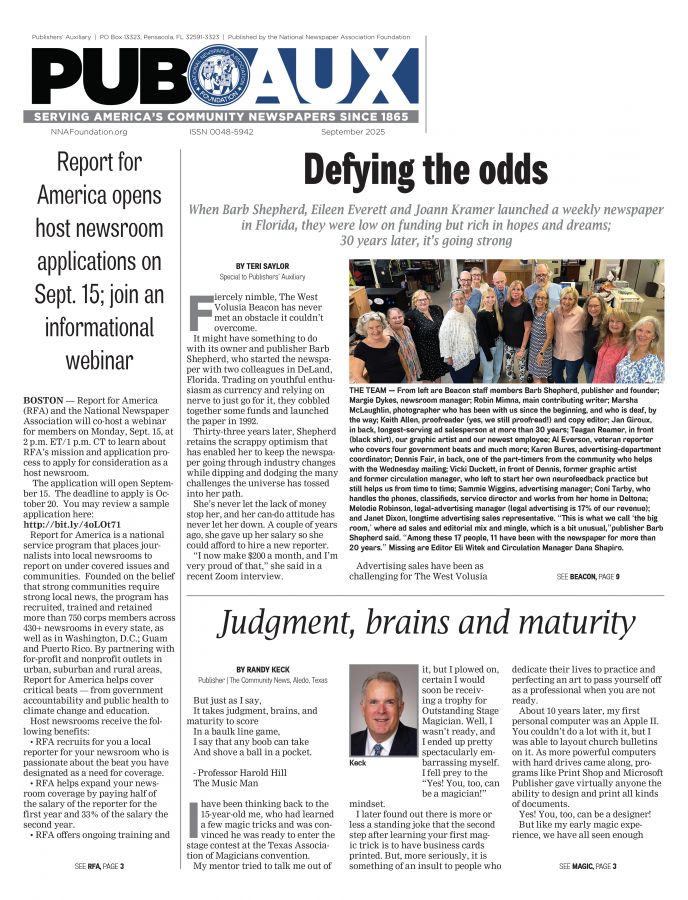Postal reform is back on the table for 2014
Dec 10, 2013
By Tonda F. Rush
CEO | NNA
WASHINGTON—Progress toward legislative reform for the U.S. Postal Service stalled in November when the mailing industry and labor organizations united in opposition to the Postal Reform Act of 2013 being considered in the Senate Committee on Homeland Security and Governmental Affairs.
The bill, S 1486, contains provisions proposed by Sen. Tom Coburn, R-OK, to dismiss the Postal Regulatory Commission from most of its role in regulating rates and service. Mailers groups, including National Newspaper Association, object to deregulating the government monopoly.
As committee chair, Sen. Thomas Carper, D-DE, prepared the bill for committee passage, a fellow Democrat, Sen. Tammy Baldwin of Wisconsin, readied amendments to restore the PRC oversight. A campaign to solicit supporters in 13 states represented by senators in the committee netted a long list of backers for Baldwin. NNA, with assists from state press associations, provided more than 300 signatures for Baldwin.
NNA’s government relations chair, Deb McCaslin, publisher of the Custer County Chief in Broken Bow, NE, said the Coburn provisions threw the reform process into reverse. The bill also contains no protections against new Negotiated Service Agreements, like the deep discounts for Valassis Direct Mail that USPS offered in 2012.
“No postal reform legislation is without controversy because it touches on service, postage rates and labor costs. We ended last year with a pretty good compromise bill that we thought would be our starting point this year. Coburn’s belief that the monopoly should be deregulated introduced a new element into the discussions. Although we respect his interest in getting the Postal Service healthy again, we cannot agree that giving unfettered power to set rates would be good for USPS, our newspapers or the nation. It would inevitably lead to much higher prices for mail USPS considers a burden on the system while leading to lower prices for mail it considers competitive—like saturation advertising mail,” McCaslin said.
Further consideration of S. 1486 is now set for mid-December. The delay dooms chances of passage in 2013.
McCaslin said publishers should expect to do battle on postal reform during the NNA “We Believe in Newspapers” Leadership Summit, March 13, 2014.
“I would like to say this legislation will be finished by March. Sadly, I think we have a long way to go to guarantee reasonable mail delivery and fair competition for community newspapers,” she said.
In other postal news:
• The U.S. Court of Appeals for the District of Columbia upheld the PRC’s decision to allow the Valassis NSA discounts. Although the court decision found fault with the PRC’s reasoning, it ruled that its policy of deferring to expert agencies governed.
• The PRC heard USPS witnesses in November on why a 6.9 percent exigency rate increase is needed for January. The PRC questioned whether USPS losses were fully tied to the Great Recession, which it has deemed a sufficient exigency to justify extra rate increases, or were part of ongoing disruption from the Internet. A decision in the case is expected in late December.
• USPS is preparing a new policy statement on the processing of flat mail, including newspapers. NNA is involved through the Mailers Technical Advisory Committee in laying out the road map for mail processing hubs to keep direct carrier route and 5-digit mail containers from going unnecessarily into distant mail processing centers. That report is due Dec. 31.
• A serious programming error in USPS’ operating system, PostalONE!, is kicking out too-high rates for mailing software providers when mail includes both in-county and outside county mail with Intelligent Mail Barcodes. NNA’s MTAC representative Bradley Hill, president of Interlink Inc., registered a complaint with USPS management in November. He noted that publishers would be unlikely to convert to the barcode use if penalized by the wrong rates. USPS said it was working on a repair.






